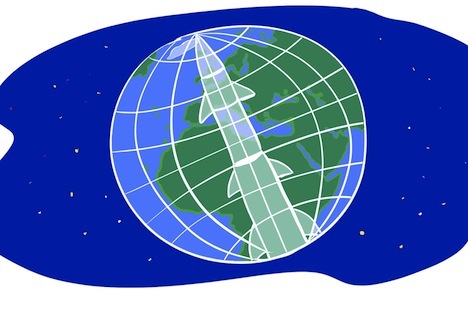Why Russia needs to build up its military strength

Drawing by Alexei Yorsh. Click to enlarge the image.
Russia has set its sights on building up its military capacity. Programs are being put in place to re-equip and reform the country's armed forces. Although the external military threat has never been lower, the policy will continue, since it dovetails with the emerging international realities and complies with the internal logic of Russia's development.
Is military force losing its relevance?
It is a widely held notion that military force is becoming progressively less important. Indeed, most of the major global challenges – climate change, the demands of the masses for greater prosperity, the financial crisis, the growing food deficit – cannot be solved militarily.
Related:
Russia looks at hypersonic flight plans
Why Russia upgrades early warning systems
Although it is the strongest military power, the United States is, in fact, about to lose two wars, both of which it initiated, in quick succession: Iraq and Afghanistan. And, politically, multi-trillion investments in arms are becoming obsolete.
However, there are other factors and arguments that contradict the notion that military force is on its way out.
Wars are still there to be won: recall the widely differing conflicts in Yugoslavia, Libya, Chechnya, and Georgia. The nuclear deterrent prevents major wars, and no country is serious about reducing its nuclear arsenal; on the contrary, nuclear weapons are being upgraded.
There is no end to the talk about impending conflicts over resources and water. In today's world, it seems that direct seizure of territory and resources no longer turns the trick. Nevertheless, military methods can secure vital supply lines.
The desire to rely on military force is prompted by another circumstance: in recent years, the course taken by the West has left a trail of indignation.
Western countries, under the slogan of supporting democracy, contributed to the downfall of the authoritarian but secular regimes of Egypt, Tunisia, and Libya. Syria is next, although they are fully aware that behind the subversion stand not only the discontented masses, but also the fundamentalist Sunni monarchies of the Persian Gulf. The latter oppose Western values a great deal more than the regimes that have been overthrown.
The loss of the West's strategic orientation, which is the inevitable result of its prolonged crisis and radical political behavior, has added another brushstroke to the colorful picture of the chaotic and unpredictable future world that is emerging.
It also lends weight to the arguments of those countries – including Russia – that are inclined toward greater reliance on sovereignty, strength, and other tangibles.
Russia and military force
Russia, too, has begun to build up its military capability. Today, none of the world's armed forces poses a conscious threat and, in the medium term, will be unable to do so. As a nuclear superpower, the country is immune to a large-scale attack.
However, despite the absence of such a threat, the pursuit to strengthen military power remains inevitable – and not only because of the need for modern armed forces to be able to counter direct security threats. In the eyes of Russia's leaders, a strong military force is required to preserve the country's international standing, and the current development model proposes no other way of ensuring that.
Of course, it would be much better to be strong economically, technologically, culturally, and spiritually. But that is for a later date. Right now, military reform is top of the agenda.
Russia's military reform
The most amazing and demonstrative aspect of the military reform is that, despite enormous obstacles and opposing views, it has been very successful.
A truly revolutionary reform of the armed forces is underway: from a vast, traditionally mobilized army, designed primarily for major land conflicts to counter the threat from the West, to a leaner, more professional army in a permanent state of combat readiness, focused on conflicts of low and medium intensity.
To prevent major conflicts, increased reliance is being placed on nuclear weapons, which are also being upgraded. Troops have at last begun to be equipped with next-generation intercontinental ballistic missiles that are able to outdo any missile defense system.
A strong nuclear capability, essentially intended never to be used, is still needed to thwart any attempt to put pressure on Russia by nations with superior conventional forces.
For all intents and purposes, the objective aim of modernizing the armed forces is not only to counter security threats and reinforce Russia's international political status, but also to close off the many channels in the global arms race that have the potential to undermine international military and strategic stability.
At the same time that it is ensuring its security and status, Russia is regaining its role as a key guarantor of international peace.
The achievements are still offset by problems and mistakes, but Russia is on the path to becoming a modern military power. What exactly will be achieved as a result is still an open question, as indeed are most issues in the world today.
Sergei Karaganov is a political scientist, chairman of the Council on Foreign and Defense Policy, chairman of the editorial board of the journal Russia in Global Affairs, and dean of the Faculty of World Politics and Economics at the Higher School of Economics.
Unabridged original Russian text is available here.
First published in Russia in Global Affairs magazine.
All rights reserved by Rossiyskaya Gazeta.
Subscribe
to our newsletter!
Get the week's best stories straight to your inbox
